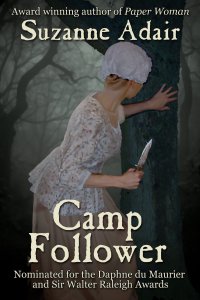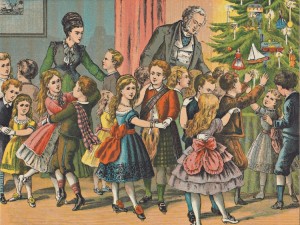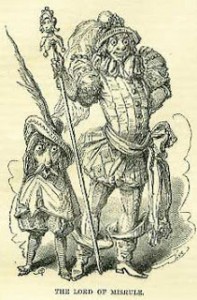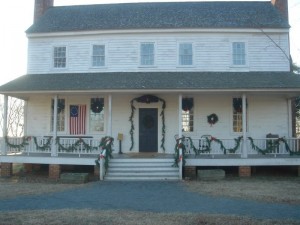 Welcome to the Christmas party blog hop, and thank you for stopping by. Have you ever wondered how people from other times and places celebrated the winter holiday? Each of the authors on the list at the end of this post is sharing an idea about it today. Some authors also have giveaway prizes for you. Visit the blogs, and enjoy this festive season with us.
Welcome to the Christmas party blog hop, and thank you for stopping by. Have you ever wondered how people from other times and places celebrated the winter holiday? Each of the authors on the list at the end of this post is sharing an idea about it today. Some authors also have giveaway prizes for you. Visit the blogs, and enjoy this festive season with us.
*****
It certainly wasn’t “all work and no play” for King George III’s army when it attempted to subdue that pesky insurrection in North America. The Brits did their share of “entertaining” while on American soil. Mischianza, anyone?
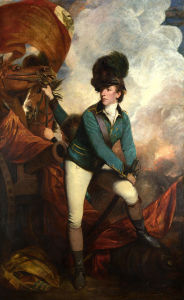 Some Brits qualified as true party animals, and one of those party animals, Banastre Tarleton, commanded the British Legion, a provincial unit that wreaked havoc among the patriots living in the southern colonies in 1780 and 1781. A drinker, gambler, and womanizer, Tarleton had goofed off at University College, Oxford and blown through his inheritance before hitting his stride as a light cavalry officer during the American Revolution.
Some Brits qualified as true party animals, and one of those party animals, Banastre Tarleton, commanded the British Legion, a provincial unit that wreaked havoc among the patriots living in the southern colonies in 1780 and 1781. A drinker, gambler, and womanizer, Tarleton had goofed off at University College, Oxford and blown through his inheritance before hitting his stride as a light cavalry officer during the American Revolution.
Tarleton is a secondary character in my novel Camp Follower: A Mystery of the American Revolution, set in late 1780 and early 1781. (Here’s why I included him.) And because Tarleton was the kind of fellow who’d never have passed up seasonal festivities, there’s a December winter holiday feast and dance in Camp Follower to give readers an idea of how a Crown forces unit might have celebrated in the backcountry of South Carolina. It’s a Yule party, not a Christmas party—and here’s why. Writing that scene gave me the opportunity to show another side to Tarleton and the Legion: soldiers at rest, not fighting their way through the backcountry. A devastating battle would come all too soon for them on 17 January 1781 and is depicted in the book’s climax.
Here’s an excerpt from the Yule party in Camp Follower:
The morning of the twenty-fourth, day of the Yule celebration, [Helen] awoke to the aroma of roasted hog and root vegetables, slow-cooked the night before in pits…A substantial amount of cooked hog and vegetables, baked apples and pears, and cornbread vanished before dark — largesse from Tarleton, distributed among the rank and file.
After nightfall, in a torch-rimmed field north of the manor house, Helen, her garnets at her throat and ears, wandered from a huge bowl of mulled cider to a huge bowl of waes hail to a supply of the best wines from market…During the first course of onion soup, she was seated next to Fairfax, but they ignored each other, and the fellow on her other side stayed sober long enough to hold a lucid conversation about deer hunting…The soup was cleared away, a bell rang, and the men scrambled to switch seats, to the laughter and surprise of the ladies. Broiled bass appeared on the tables, and Helen got to hear about horse racing and advantages of various firearms from a cornet and a captain…
The bass vanished, the bell rang again, and Tarleton, ruddy-cheeked, wine goblet in hand, redirected an officer of the militia so he could plant himself next to Helen and scowl at her. Gold and braid on his uniform winked in the candlelight. “You’ve no idea how I’ve had to fight my way over here…Madam, I need your advice on a delicate matter. With whom should I dance the first tune?”
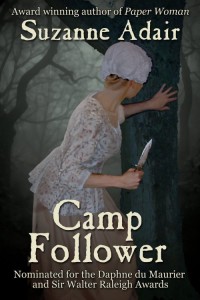 Giveaway prize: Want a book to read? Use the comment form to tell me something you learned from this blog post and what your 2014 holiday plans are like. I’ll send you an ebook copy of Camp Follower, nominated for two awards. Make sure you provide your name and an accurate email address so I can contact you. Offer expires 31 December 2014.
Giveaway prize: Want a book to read? Use the comment form to tell me something you learned from this blog post and what your 2014 holiday plans are like. I’ll send you an ebook copy of Camp Follower, nominated for two awards. Make sure you provide your name and an accurate email address so I can contact you. Offer expires 31 December 2014.
Happy holidays to all my readers. And don’t forget to check out the authors’ posts on the following list.
entertainment…
Invited to a Ball” (plus a giveaway prize) – http://tinyurl.com/nsodv78
a giveaway prize) – http://tinyurl.com/op8fz57
4. Ann Swinfen : Christmas 1586 – Burbage’s
Company of Players Celebrates – http://tinyurl.com/mwaukkx
giveaway prize) – http://tinyurl.com/qf6mlnl
in your dystopia: you need a festival of enhancement… (plus a giveaway prize) – http://wp.me/p4lRC7-aG
**********
Did you like what you read? Learn about downloads, discounts, and special offers from Relevant History authors and Suzanne Adair. Subscribe to Suzanne’s free newsletter.

